19 days after our return and I think we can finally settle back into our former routine of early nights, early mornings, working on the house, studying Spanish, hanging out at Edwin's, balancing the work and the relaxation. Up until now, however, we've spent as much time away from Buenos Aires as in it. This is in part due to Grant and Linda's presence, and joining them on their explorations of the area. We spent a couple days up in Granada, the highlight of which was a visit to a small family run cigar factory where several people sat at ancient wooden benches hand rolling leaves grown from pure Cuban seed into tight, beautiful, aromatic stogies any aficionado would relish. Pat and Grant have decided to tell their buddies back home that the cigars were in fact rolled on the thighs of beautiful young women, but I'm afraid the pictures won't support this fantasy… Later that same afternoon we fled from a torrential downpour rivaling anything I ever saw in Thailand, and found refuge under the substantial balconies of a colonial beauty dating back to the mid 1800's. The owners had thoughtfully set out tables and chairs and even went so far as to serve us icy beers for a nominal fee. Another refugee of the rains stopped by our table, a middle-aged black man called John Oliver originally from one of the islands off the Atlantic coast, not far from Bluefields. He was now supporting himself in Granada as an artist and street musician, apparently the only one of his kind. He knew Managua well, including the bar where Pat, Edwin, and I had spent that infamous last evening before heading back to Alaska. "Dat's a bad area, Mon—whacha doin' over dere?" Which of course served to prove Reinaldo and Rosario right about their neighborhood after dark, much to our dismay. He then produced a painting he'd just completed—literally—the paint was still glistening—of a serene "Costeño" beach scene, and which we bought for around $7.00. He threw in a bottle of clear nail varnish and instructed us on its application once the picture had dried, wished us a pleasant stay, and bobbed off into the rain.
We dined that night at a renowned steak house, feasting on obscenely succulent hunks of grilled flesh, cooked to perfection and so tender the knives were almost superfluous. With drinks and a coconut flan I would willingly sell Patrick for, the tab came to $15 apiece—at least nearly four times the usual--but worth every peso.
Soon after our return to Buenos Aires we headed off again, this time back to Ometepe Island, to the sector we hadn't explored last winter on our bikes, and where Grant and Linda had recently completed the tedious process of purchasing land. Their lots, both right on the lake, about half a mile from one another, have great potential and a lot of hard work ahead. We stayed the second night at a fairly new place called El Encanto, run by an Australian woman and her El Salvadoran husband. It was absolutely lovely. Perched atop a hill, overlooking the lake, part of the volcano, and gorgeous gardens swarming with butterflies. We dined on curry and ice-cream smothered in passion fruit from the orchard, and fell asleep to the sound of rain and relentlessly energetic frogs.
On the way to visiting Grant & Linda's property, we encountered a herd of cattle taking the sun in the middle of the road. With no cowboys in sight and one particularly inconveniently placed bull in our path, Pat jumped out to have a chat with the large beastie. When that had no effect, he tried a gentle prod, followed by a not-so-gentle prod, and as a last resort, booted the bull in the ass. Nothing. We eventually managed to maneuver the car around the stubborn creature—coming and going.
A day after returning from the island, we took a road trip out to the little town of Cardenas, about 26 miles from Rivas on a newly paved (or cobbled) road, on the strip of land that winds between Costa Rica and Lake Nicaragua at the SW border. A Canadian couple we know has property out that way, and Grant & Linda were curious to see it. We had lunch at a beachfront restaurant and enjoyed some of the best chicken we've eaten to date—in a country where many establishments offer you a choice of chicken, chicken, or chicken, that's no mean compliment. After lunch, we wandered down to the beach, curious about a small ferry that had pulled up, dropped anchor, and begun unloading a series of very large pigs. The swine were tied up and allowed to frolic about in the water while the rest of the freight, consisting mainly of plantains, was transferred to a waiting bus. (Like the majority of busses down here, it was an old US school bus, repainted and serving Nicaragua well. Most of these bussed still use the flashing red lights when they are stopping, but there are no laws for drivers to give way. I wondered the other day how many US citizens down here have caused accidents by reflexively jamming on their brakes when they see those lights…) The ferry, a small one, runs up and down the coast, from Sapoá, 15 miles south of Rivas, to Colón, the last town before Costa Rica. It carries passengers and freight, and is cheaper than the somewhat unreliable bus. We were about to leave when a group of men showed up and lead one of the pigs toward the bus. They tied a second cord around its belly, and began hoisting the now very unhappy pig up onto the top of the bus. They proceeded to repeat this process with all four pigs, each one squealing louder than the last, and clearly not enjoying themselves nearly as much as the men, several of whom were amused to have this event documented by a Gringa. In the end, the largest pig refused to lie down, and had to be secured to the railing standing up, but with a distinctly smug look on its face.
Our final trip took us to Matagalpa, one of the departments toward the north, and location of San Ysidro, Reyna's hometown. She invited us to accompany the family on their bi-annual visit, and we eagerly accepted. Our only provision: allow us to rent a minivan because the idea of six adults, two kids, a couple hundred pounds of plantains, and a surprisingly large amount of baggage strained the limits of Edwin's wee pickup—not to mention the likelihood of encountering severe downpours enroute. They thought we were nuts, but humored us, and so after two damp, cramped, sweaty hours up to Managua, we made the exchange for a Suzuki 8-seater with AC. Pat drove, Edwin navigated, and everyone else was much more comfortable—damn pampered Gringos…
Although only about five hours north of Rivas, the landscape is very different. Mountainous, in some areas forested, others wide open for cattle. It was noticeably cooler as we climbed, a welcome respite from the cauldron of Managua. The last five or six miles into Reyna’s small neighborhood was on a road so pocked with holes it was like driving across a cheese grater. Vehicles were swerving from one side to the other, desperate to decrease full-on contact with these craters, narrowly avoiding the ubiquitous cyclists, meandering cows, frolicking horses, scavenging dogs, and the strategic checkpoints set up by the kids every mile or so, bits of string knotted together and strung across the road, just where the potholes seem insurmountable, and pulled up as cars approached. Accompanied by cries of "Un peso!", they tend not to drop the string until the very last minute, resulting an a lot of snapped strings and angry shouts of "Pinche!" ("Cheapskate!")
Reyna is the eldest of eight, aged 18-28, seven of whom are sisters, and six of whom already have kids of their own, most of whom are also girls. Five of the siblings still live in the area, while three sisters are in Buenos Aires. Her mother, Amelia, is under 50, and her very vibrant granny, called "Mamacita", is 64. They live just about across the road from each other, in simple brick structures with no windows, open eaves, and solid wooden doors. (I will apologize here for not having many photos—the NEW batteries spontaneously failed and I didn't have spares since they generally last longer than half a dozen shots. Very frustrating.) Rough poured concrete covered Amelia's floors, while Mamacita had just had concrete tiles installed two weeks earlier, covering 46 years of well-swept dirt. Both woman had semi-open kitchens, and cooked exclusively on wood-fired clay ovens. Amelia had a fairly new fridge, however, which she shared with her mother. Water is a serious problem for the entire area, especially in the rainy season when the river behind their homes is too muddy to use for anything. They collect as much rainwater as they can, and get their drinking water from a public well about a mile away, bringing it home by bicycle in three gallon buckets. Both homes boasted televisions, DVD players, at least one Nintendo, and extensive stereo equipment, but very little else besides beds, an endless supply of plastic stacking chairs in Amelia's house, and four well-made rockers at Mamacita's. Animals were everywhere: innumerable chickens and their chicks, darting in and out of the house, between our legs and those of the skinny dogs hanging about. Mamacita loves animals and actually has pets, a new puppy called Belin, and a small one-eyed cat with a pronounced limp and a tendency to ambush Belin. Also, there is Mateo, a huge, elegant turkey who comes when called and nearly charged Pat early the morning after we arrived, an apparent show of masculine dominance. A chatty parrot and several parakeets rounded out her menagerie, all keeping her company as one by one her remaining nine children have all moved away, leaving only Amelia, and Eddy, the youngest son, and the only one still living at home.
The area is ringed by rice fields, resulting in an incomprehensible number of mosquitoes, all starved for blood. Everyone sits around, inside or out, constantly swatting and smacking themselves absently, unconsciously. I smothered myself in repellent by day, long sleeves and trousers at night, and still they harassed me. The women fretted over me, concerned my impressions of Matagalpa might be compromised by these relentless wee vampires. Never mind, I assured them, in Alaska we have mosquitoes so big they're thought of as the state bird. Perhaps, they countered, but do your mosquitoes carry malaria and dengue? Point, Matagalpa. I added another layer of Deet and joined in the slapping.
The first evening was for celebrating the arrival, and so we piled into the minivan and drove back over the remains of the road to the nearby city of Sebaco, known for—actually no one seemed to know what it was known for, other than cheap delicious produce and really bad roads. They wanted to go to a place with music, drinks, and cheap local food, but no such place seemed to exist and we first ended up at some flashy upscale, and by their standards, overpriced joint done up in a quasi-German décor. Food was scorned, but everyone had a drink or two before squeezing back into the van to begin an hour-long, ultimately fruitless quest for a better location. At last someone remembered an out of the way little rustic joint right near Reyna's house, so back down the road from hell to what looked from the outside exactly like Amelia's place, but inside was much rougher. An uneven dirt floor supported several plastic tables and chairs, and irregular brick walls upheld posters of scantily clad blond girls panting for local beers. One wall boasted a stack of speakers taller than me, wired to the substantial stereo system kept in the small kitchen/bar area, behind a low brick room divider, and watched over by the middle-aged couple that ran the joint. At the far end was a jukebox (know here as a "rockanola") dating from the early 50's, with a music selection from the same time. Ranchero, or Mexican ballads, dominated, each on a scratchy 45, accessible for one peso (6¢) and vigorous button pushing. After a round of carne asado covered in coleslaw and a few more beers, Tomás, Reyna's stepfather, surprised everyone by asking me to dance, and kept everyone laughing by constantly prodding me into the lower part of the floor (Tomás is maybe 5'5 in his shoes).
The only other patrons were two drunken local boys, who kept to themselves, and after we got it going, spent a lot of time leaning over the jukebox trying to read the faded song labels and laughing at the outdated music. Eventually they staggered through door, somehow mounted their rickety bikes, and swerved off into the darkness.
The following day a bunch of us headed northeast to visit the famed coffee plantation and visitors' paradise of Selva Negra. On land settled by Germans over a hundred years ago, this third generation has built a sprawling settlement including a lovely restaurant, cabins, a wedding chapel, hiking trails, and much more, all in the German style, but well integrated with the surroundings. The owner, Eddie Kuhl, and his wife, began developing the land in 1975, after realizing that if they sold it off, the new owners might not respect it as their families had. We had a chance to meet him, and were entertained by his stories for nearly an hour, on topics ranging from world wars to Nicaraguan politics to American cowboys (one of his daughters married such a man, much to his amusement). Afterwards, we had some lunch, bought some "European" cheeses, including a very passable Camembert, and toured the grounds. A friend (from L.A.) has planned to have his wedding there a year from December, so we are fortunate to have a good reason to revisit and spend more time.
And as of today, Monday, the 1st of October, Patrick is out happily chainsawing up wood for our lakeside neighbors, while I am here in town, running errands. English classes resume on Wednesday, and life is back to normal.
Subscribe to:
Post Comments (Atom)
Mechanics (or so they say)

Cyclo
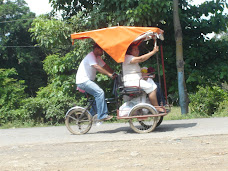
These guys really have to work sometimes.
Cyclo ready for the rain.
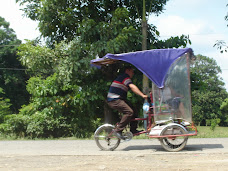
Kind of like Ben Hur, Nica style...

Cart with kids (usually used for hauling much more)
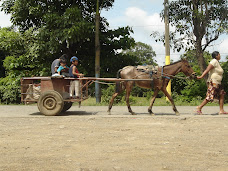
I think there are at least 10 people in there.
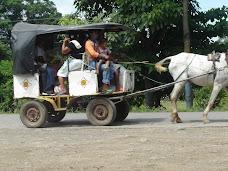
A better angle.
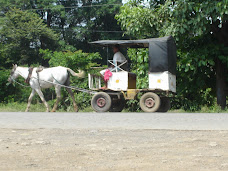
They never looked like this back home...
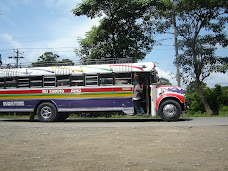
Delivery boy.
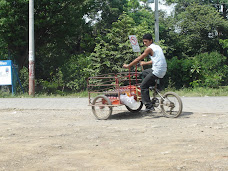
Pat and a local 'puro'.
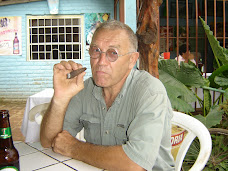
Doesn't he look like a character out of a Graham Greene novel?
The flower market
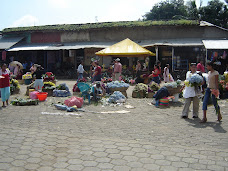
More flowers.
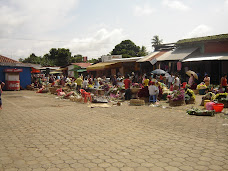
Sorting the platanos.
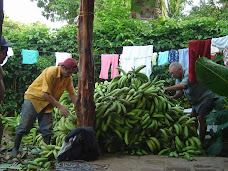
Highest quality are sold in Managua; the rest in Rivas.
Unloading fresh platanos at Edwin's.
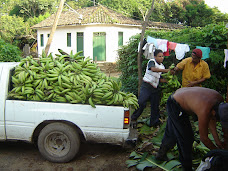
This was the last from this crop. There'll be more in 15 days.
Me, Nicole and Jeysy, daughters of a couple new friends.
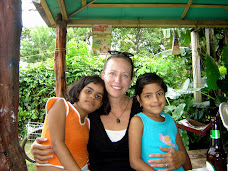
Our jeep and a neighbor's horse at the lake house.
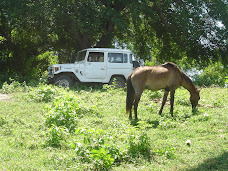
Buenos Aires Marching Band at China's birthday
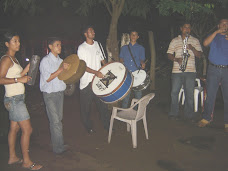
Pat dancing--the bell of the ball at China's bash
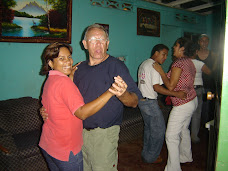
Possibly the world's cockiest rooster
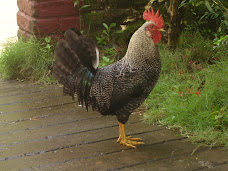
Pun intended...he's not too bright, but has a hell of a crow
Day of Oxtail soup that wasn't...
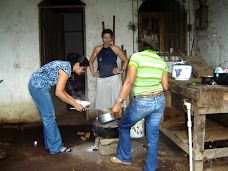
Our hosts overslept and missed the oxtail, so it was just beef.
Leaning pole of power
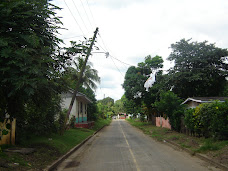
(I just learned another truck has torn it free...)
Our new Beastie
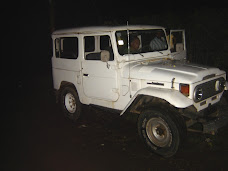
Land Cruiser's cute backside
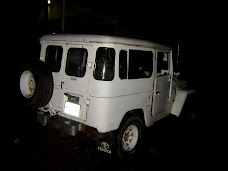
Land Cruiser, me, Rosita, Milagro
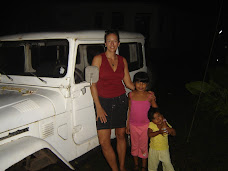
Pat and Milagro, enjoying the view atop the LC
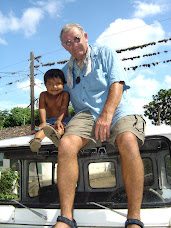
Chepita/Lulu

Pat and the luckiest dog in the world: Dogui
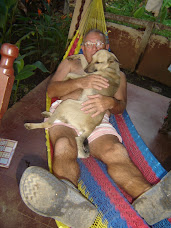
Diablos
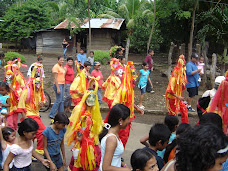
Note Jeysy's house in the background, where Einstein lives.
More Diablos

Guy in center in black is the leader.
And more Diablos
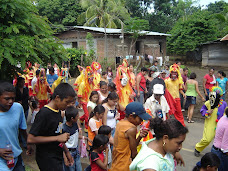
See odd Scary Movie dude up front...
The Man of the Hour: St. Francis
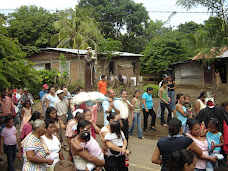
The guy in front is NOT a Gringo, but everyone affectionately calls him "Whitey"
A slice of life for Nica kids
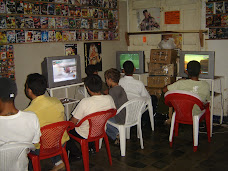
Just a little guy

This one was in the rental, about half the size of the one in the beach house
Packing cigars ("puros"), Granada
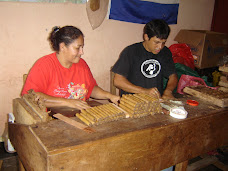
Rolling cigars, Granada
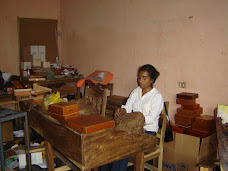
Fresh painting, Granada
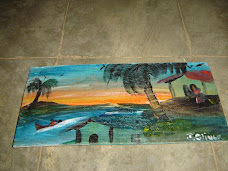
Lake at Granada
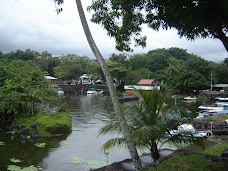
Field of butterflies, Ometepe
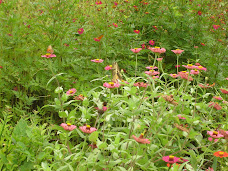
Water bus unloading, Cardenas
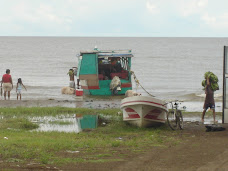
Happy pigs, waiting for the bus
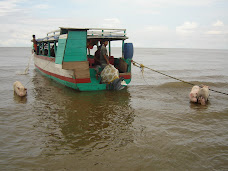
Loading pigs in Cardenas
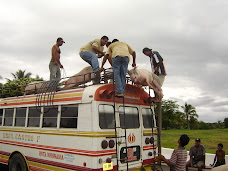
Pat and the Bull, Ometepe
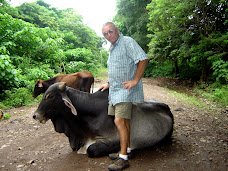
Amelia's house in Matagalpa
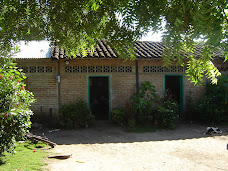
Rosita, Milagro, and 2 cousins, Matagalpa
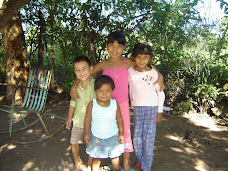
The gang at the Matagalpa bar
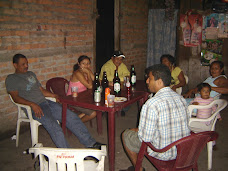
Local boys on ancient jukebox
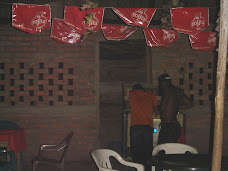
Chapel at Selva Negra
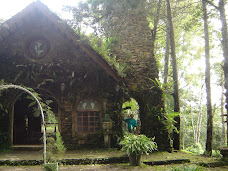
Wedding Chapel, rear, Selva Negra
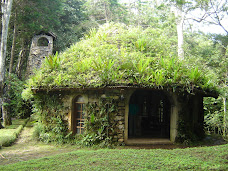
Wedding chapel inside, Selva Negra
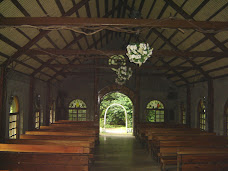
Stone gazebo at Selva Negra
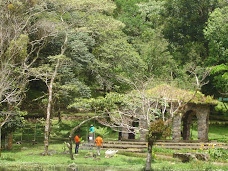
Our resident spider
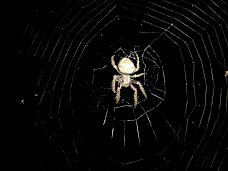
Einstein with flower
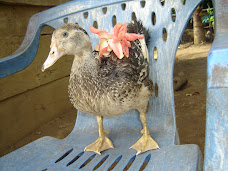
Doña Juana, Jeysy, & Einstein
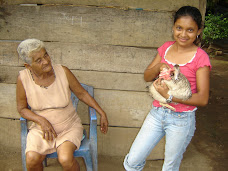
Grant & Linda at Laguna Apoyo
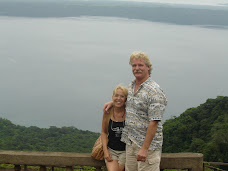
Pat milking Walter's cow
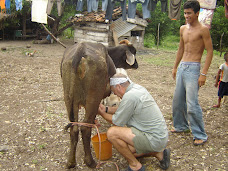
Reyna & kids at local pool
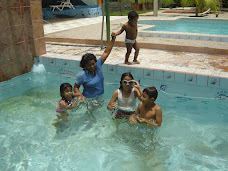
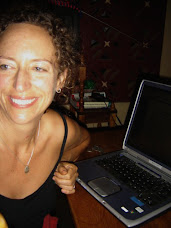

No comments:
Post a Comment